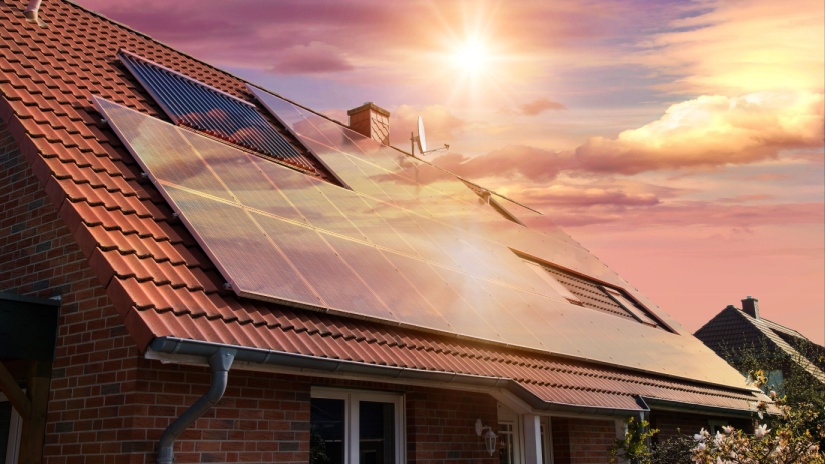Knowledge Centre
What are solar panels?

You might have encountered discussions about solar panels recently, especially with the surge in energy costs faced by Australian households in recent years. So, why is there so much interest?
Whenever you use appliances like dishwashers or stream shows on Netflix, you're consuming electricity, which adds up to your monthly or quarterly energy expenses if you're the one paying the bills.
Solar panels offer a solution to mitigate or even eliminate these energy costs by converting sunlight into electricity for your home. Given the sunlight hours available in Australia, it makes sense for residents and businesses to choose investment in solar panels. This guide will explore what solar panels are and the advantages they offer.
What is a solar panel?
A solar panel is a device that turns sunlight into electricity using photovoltaic (PV) cells, which are usually made from silicon. These cells are arranged in panels, covered by glass, and framed with metal. The more sunlight the PV cells get, the more electricity they produce.
Typically, solar panels are installed on roofs to get as much sunlight as possible. The angle and direction of the panels are important, and they should be placed where they won’t be shaded too much. Even on cloudy days or in winter, solar panels can still produce some electricity because they work with light, not heat.
Solar panels come in different sizes and qualities, and manufacturers both in Australia and abroad make them. A solar installer can help you choose the right panels based on your budget and how you plan to use the energy.
Solar panels are just one part of a solar system, which may also include an inverter and sometimes a battery. This system helps convert and store the electricity for use in your home.
What are the benefits of solar panels?
There are tons of benefits of having solar panels on your home or your office building. So much so, larger commercial buildings are now looking at solar panel installation. Here are the benefits of using solar panels:
Saving money
The first benefit - and probably biggest reason - that people choose to use solar panels is the money savings they can make. By generating your own electricity, you can lower or even eliminate your monthly energy bills.
Not only can you save it, but you have the potential to earn money, too. Excess energy produced by your solar panels can often be sold back to the grid in many regions, providing additional income.
Saving the environment
Who doesn't want to give back to the environment? Solar energy is a renewable source, and the best thing about it is that it’s abundant. The sun isn’t going to switch off any time soon, which means that you can use solar energy for years without worrying it’s going to stop - and you can reduce your reliance on fossil fuels at the same time.
Using solar panels ensures that you reduce greenhouse gas emissions and do your part for combating climate change at the same time. Not only this, buying solar panels doesn't chug out tons of polluted air. This means that you can breathe easy knowing you’re using something that reduces air pollution.
Reducing grid reliance
Solar panels allow you to generate your own electricity, reducing dependence on the electrical grid and protecting against fluctuating energy prices. The fact you’re also able to enjoy backup power is a plus.
With battery storage, you can have a backup power supply during outages or emergencies, and given the rate of tropical storms in Australia, knowing you can keep the power on is super helpful.
Improved property value
Homes with solar panel installations often have higher property values and are more attractive to buyers. Who wouldn't want to buy a property that is actively helping the environment?
Easy to maintain
Solar panels require very little maintenance. Regular cleaning and occasional checks are usually sufficient to keep them functioning efficiently.
You can ask your solar installer about warranties, but most solar panels come with warranties of 20-25 years and have a long operational life.
A free energy source
Once installed, solar panels use sunlight to generate electricity at no additional cost and solar systems can be expanded or upgraded as needed, allowing for flexibility in meeting future energy needs.
Improved efficiency
Advances in technology continue to increase the efficiency and effectiveness of solar panels, making them more cost-effective. Modern solar panels are available in various designs, including flexible and aesthetically pleasing options.
Government incentives
Many governments offer financial incentives, such as tax credits, rebates, or grants, to reduce the initial cost of solar panel installations.
Some regions provide net metering programs that credit solar panel owners for excess energy sent back to the grid. Another incentive for those choosing solar is that the solar industry creates jobs in manufacturing, installation, and maintenance, contributing to local economies.
How are solar panels used?
Solar panels have a wide range of applications, and they can be used in business, agriculture and residential settings. Understanding how they’re used can help you to decide whether you should get them, too. Here are some of the primary uses:
Residential use
Solar panels can power all the electrical needs of a home, reducing or eliminating reliance on the grid. It can be used for heating water, providing space heating, and powering air conditioning systems, too, which is helpful for your power bills while trying to heat or cool your home.
Solar panels can also be used to power indoor and outdoor lighting systems, including security and garden lights, which should give you some security.
Commercial use
Businesses can use solar panels to reduce their electricity bills and improve their environmental footprint much in the same way residential customers can. Solar energy can power industrial processes and machinery, helping factories to become more sustainable.
Solar panels can also supply power to office buildings, reducing operational costs and promoting corporate sustainability. Given the emphasis on sustainability in business, solar panels should be the first thing business leaders consider.
Agriculture
Did you know that solar-powered pumps can be used for irrigation, making it easier for farmers to water their crops? These systems consume a lot of energy but with the help of solar panels, the cost won’t be as huge.
Solar panels can provide the energy needed for heating, cooling, and lighting greenhouses, too, ensuring that herbs and crops are able to grow. It can also power electric fences, water pumps, and other equipment necessary for livestock management, which is helpful for farmers.
Remote and off-grid applications
Solar panels are ideal for providing power in remote locations where grid access is unavailable or unreliable. People who want to live off-grid can still work, stay warm, cool their homes and more when they choose to use solar panels.
Solar panels can also power remote communication towers and equipment, rural clinics and schools. In off-grid areas, solar panels can provide essential electricity for lighting, refrigeration, and medical equipment, making sure that people are still able to access essential services.
Transportation
Solar panels can charge electric vehicles, either through direct solar charging stations or by supplying power to the grid. Some public transport systems, like buses and trains, use solar panels to power operations or auxiliary systems, too. Boats and aircraft can also use solar power to improve fuel efficiency and provide auxiliary power.
Portable and emergency power
Small solar panels can charge electronic devices like smartphones, tablets, and laptops, making them useful for camping and outdoor activities. If you’re off camping or going off-road, you don't have to find yourself out of luck if you break down.
Solar panels can provide power during emergencies or natural disasters when the grid is down.
Utility-scale power generation
Solar farms play a big part in utility-scale power generation. Large-scale solar power plants, or solar farms, generate electricity for distribution to the grid, supplying power to thousands of homes and businesses.
It’s great for those who want to have more of a community, too, as solar panels can be installed in a central location, allowing multiple households or businesses to share the benefits of solar energy.
Specialist applications
Solar panels aren't just used on earth. Solar panels are used to power spacecraft and satellites, providing a reliable energy source in space so that work can continue on satellite repair and maintenance.
Solar panels have also been integrated into clothing and accessories to power small devices for fitness and geolocation purposes. Lastly, solar energy can power desalination plants, providing fresh water in arid regions.
Are solar panels expensive?
When purchasing solar panels, you’ll find that these are usually part of a complete solar system, which also includes an inverter and sometimes a battery. Therefore, isolating the cost of just the panels might not give a clear picture of the total expense for setting up solar energy in your home. The price of solar panels can vary depending on the brand and the number of panels you need.
While the initial cost of installing solar panels can be significant, often running into thousands of dollars, it's important to weigh this against the potential savings on your electricity bills and any feed-in tariffs you might receive for supplying excess solar power back to the grid. This period, known as the payback period, is estimated to average between three to four years for residential solar systems.
There are various rebates available that can help lower the initial cost of solar panel installation, along with different financing options to make the investment more affordable. You can check out solar plans with our energy providers. While our energy plans won’t give you the solar power system, you can lower the cost you’re currently paying for your existing solar panel system.
Contact Compare Energy
Ready to upgrade your solar plan? Call our Aussie-based team today on 1300 790 106 and let’s get you started.

